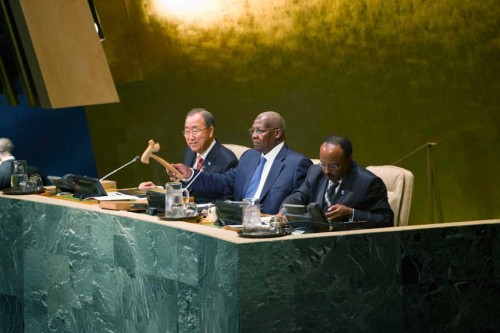
We can all recall our first time being a delegate in the General Assembly at a Model UN conference, walking up to the front of the room only to tremble before hundreds of students. Now, this week real delegates representing United Nations member states, including over a hundred heads of government ranging from U.S. President Obama to Costa Rican President Luis Guillermo Solís, will come together to discuss the most prominent issues plaguing our planet. “GA Week” is an important time for the Model UN community to celebrate the international community’s dedication to solving world issues through global dialogue and transnational cooperation, mirroring the actions we take in Model UN conferences. For the purpose of this article, we will highlight a few key agenda items to be discussed this week and outline their immediate and long-term importance.
Climate Change
On Tuesday September 23rd the U.N. Climate Summit will be held, the first time that world leaders will unite in a global response to climate change in more than five years. The key facts about this topic are that the planet’s increasingly unstable climate conditions are posing a threat to humanity’s wellbeing; sanitary water and food sources, protection from disease, and clean air are slowly becoming limited as our globalized economy carves up our remaining resources at the expense of the environment (“Climate, Health, and Jobs”). Costa Rica will be one of many countries leading this topic, as President Solís will be one of the main speakers at the Summit to bring awareness to Costa Rica’s efforts towards resolving climate change in their region, acting as a role model for other countries. Moreover, a few Chinese delegates will be panelists for special sessions of the Summit dedicated to the discussion of the relationship between the economy and the environment, as China’s rising economy has fueled ecological damage, an area of environmental controversy.
If you would like to discover more about the U.N. Climate Summit or follow up on the decisions they will make at the Summit, please check out their website. Also, for more information about the complex issues of climate chance and the social movements geared toward urging policymakers to take action on climate change, check out this video.
Ebola Outbreak
With the lack of medical infrastructure, health education, pure drinking water, and sanitation, many African nations have experienced deadly outbreaks of Ebola, a highly infectious virus with no known cure that has already killed nearly 2,500 people. With the current outbreak killing half of those infected, the international community has placed Ebola as one of the largest agenda items to be discussed in the General Assembly. Already, on September 19th, the General Assembly urged Secretary General Ban Ki-moon to “promptly establish the United Nations Mission for Ebola Emergency Response (UNMEER)” in a resolution passed this week (Resolution A/RES/69/1). Leaders on this topic include many African nations, such as Liberia and Uganda, as they have been working closely with the World Health Organization to combat the virus and believe there can be hope for their citizens to survive this deadly outbreak through emergency medical aid and relief to affected areas.
Additional Information
- An article by the UN News Centre highlighting the United Nations’ commitment to this topic.
- Ebola explained in a 60 second video by BBC.
- A New York Times article covering this topic, focusing on recent solutions decided by the Security Council and the disease’s effect on the world.
Syria and Iraq Crisis
The Islamic State of Iraq and the Levant, alternatively known as ISIL, will be at the forefront of the General Assembly’s discussions this week despite lacking recognition of statehood by the international community,. This topic is a specific example of what U.N Secretary-General Ban Ki-moon has declared violent extremism, among many other heads of state that identify the Islamic State as a terrorist organization. “Together, we will address the horrendous violence in Syria and Iraq, where conflict and governance failures have provided a breeding ground for extremist groups,” Secretary-General Ban Ki-moon stated at a news conference (“UN General Assembly to Focus on War on Extremists”). Through the global dialogue fostered at the United Nations, there is hope for international consensus on actions to be taken to resolve the terrorist attacks that threaten the national sovereignty of Syria and Iraq. However, it is incredibly important to note that no humanitarian intervention can occur without Security Council approval, thus the leaders on this topic will be the 5 Permanent Members of the Security Council (USA, Russia, France, UK, and China) as they gather at a US led summit to draft military actions.
For more information on the Syria and Iraq crisis, especially if it is one of your topics at an upcoming conference, check out this visual guide by the New York Times. For articles more catered towards the United Nation’s opinion on the topic, you can stay up to date through the UN News Center’s page dedicated to Syrian Crisis articles.
To learn more about 69th United Nations General Assembly Session, click here!

